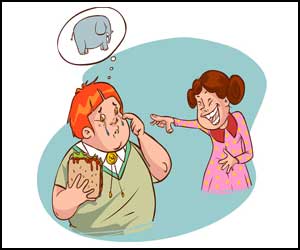- Home
- Editorial
- News
- Practice Guidelines
- Anesthesiology Guidelines
- Cancer Guidelines
- Cardiac Sciences Guidelines
- Critical Care Guidelines
- Dentistry Guidelines
- Dermatology Guidelines
- Diabetes and Endo Guidelines
- Diagnostics Guidelines
- ENT Guidelines
- Featured Practice Guidelines
- Gastroenterology Guidelines
- Geriatrics Guidelines
- Medicine Guidelines
- Nephrology Guidelines
- Neurosciences Guidelines
- Obs and Gynae Guidelines
- Ophthalmology Guidelines
- Orthopaedics Guidelines
- Paediatrics Guidelines
- Psychiatry Guidelines
- Pulmonology Guidelines
- Radiology Guidelines
- Surgery Guidelines
- Urology Guidelines
Body shaming linked to more weight gain among children, suggests NIH study

Body shaming is common with children who are oversize than the normal body weight. Teasing for being overweight can take an emotional toll on children and can make them feel isolated and embarrassed. In a study conducted at the National Institutes of Health, scientists have found that children experiencing high levels of body shaming because of being overweight gained an average of .20 kg (.44 lbs) per year more than those who did not. The study appeared in Pediatric Obesity.
The study found that children who said they were teased or ridiculed about their weight increased their body mass by 33 % more each year, compared to a similar group who had not been teased.
The study involved 110 children who were an average of 11.8 years of age when they enrolled. The participants were either overweight (defined as a body mass index (BMI) above the 85th percentile) when they began the study or had two parents who were overweight or obese. At enrollment, they completed a six-item questionnaire on whether they had been teased about their weight. They then participated in annual follow-up visits for the next 15 years.
The researchers found that children experiencing high levels of teasing gained an average of .20 kg (.44 lbs) per year more than those who did not. The authors theorize that weight-associated stigma may have made children more likely to engage in unhealthy behaviors, such as binge eating and avoiding exercise. Another possible explanation is that the stress of being teased could stimulate the release of the hormone cortisol, which may lead to weight gain.
The findings appear to contradict the belief that such teasing might motivate children to change their behavior and attempt to lose weight. The study was conducted by Natasha A. Schvey, Ph.D., of the Uniformed Services University of the Health Sciences in Bethesda, MD, and colleagues at NIH's Eunice Kennedy Shriver National Institute of Child Health and Human Development and National Institute of Diabetes and Digestive and Kidney Diseases.
For more details, please click on the link

Disclaimer: This site is primarily intended for healthcare professionals. Any content/information on this website does not replace the advice of medical and/or health professionals and should not be construed as medical/diagnostic advice/endorsement or prescription. Use of this site is subject to our terms of use, privacy policy, advertisement policy. © 2020 Minerva Medical Treatment Pvt Ltd